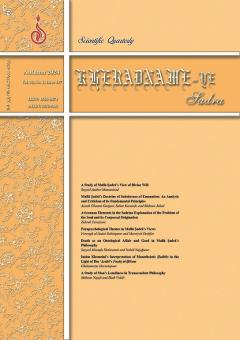Imām Khomeini’s Interpretation of Monotheistic Ḥadīths in the Light of Ibn ‘Arabī’s Fuṣūṣ al-Ḥikam
Subject Areas : مطالعات حوزه عرفان و کلام اسلامی
1 - Assistant Professor, Gnosis Department, Research Institute of Imam Khomeini and the Islamic Revolution, Tehran, Iran
Keywords: Ibn ‘Arabī, Imām Khomeini, unity of being, Infallible Imām (‘a), Shi‘ite ḥadīth, Fuṣūṣ al-ḥikam,
Abstract :
Gnostic monotheism has been founded on the individual unity of existence; however, it has also been introduced by Shi‘ite gnostics, such as Imām Khomeini, through referring to the ḥadīths of the Imāms of the House of the Prophet (ṣ). In fact, Imām Khomeini intends to interpret and explain the words of the Infallible Imāms (‘a) by resorting to Ibn ‘Arabī’s philosophical system. In this sense, the explanation of the divine name, the true unity of truth, the spread of the supreme name of Allah, anthropomorphism and deanthropomorphism of the Truth, the abode of fate, and the origin of appearance form Imām Khomeini’s Shi‘ite interpretation of Ibn ‘Arabī’s Fuṣūṣ al-ḥikam concerning the discussion of oneness. Accordingly, in Imām’s view, if the divine name is considered following a pluralist approach, it would simply be a manifestation that is prone to difference. Nevertheless, if it is viewed following a monotheistic approach, it would be a form immune to difference. Imām Khomeini maintains that Ibn ‘Arabī’s intention of monotheism is equal to the pure true unity of the truth rather than a kind of unity, oneness, and separation that is identical with referring plural things to unity. He believes that, based on ḥadīth, the name of Allah exists in all names because of the existence of essence there. Therefore, the name of Allah is present before, after, and with everything else. Besides, in Imām Khomeini’s idea, these are the owners of true heart that accept Almighty Truth with both anthropomorphist and deanthropomorphist manifestations. He also considers the immutable archetypes to be the origin of divine fate and predestination and appearance.
قرآن کریم.
نهجالبلاغه.
صحیفه سجادیه.
ابنسینا (1418ق) الالهیات من کتاب الشفاء، تحقیق حسن حسنزاده آملی، قم: مرکز نشر اسلامی.
ابنعربی (1380) فصوصالحکم، تصحیح و تعلیق ابوالعلاء عفیفی، تهران: الزهراء.
حسنزاده آملی، حسن (1362) وحدت از دیدگاه عارف و حکیم، قم: فجر.
حسنزاده آملی، حسن (1373) انه الحق، قم: قیام.
حسنزاده آملی، حسن (1393) شرح فارسی الاسفار الاربعة، ج5، قم: بوستان کتاب.
خمینی، روحالله (1381) مصباحالهدایة الی الخلافة و الولایة، مقدمه سیدجلالالدین آشتیانی، تهران: مؤسسه تنظیم و نشر آثار امام خمینی(س).
خمینی، روحالله (1385) سرّ الصلوة؛ معراجالسّالکین و صلوةالعارفین، تهران: مؤسسة تنظیم و نشر آثار امام خمینی(ره).
خمینی، روحالله (1386) شرح دعای سحر، تهران: مؤسسه تنظیم و نشر آثار امام خمینی(ره).
خمینی، روحالله (بیتا) کشف اسرار، تهران: بیجا.
خمینی، روحالله (1410ق) تعلیقات علی شرح فصوصالحکم و مصباحالانس، قم: مؤسسة پاسدار اسلام.
قیصری، شرفالدین داوود (1397) شرح فصوصالحکم، تصحیح حسن حسنزاده آملی، قم: بوستان کتاب.
کاشانی، عبدالرزاق (1383) شرح فصوصالحکم، مقدمه و تصحیح مجید هادیزاده، تهران: انجمن آثار و مفاخر فرهنگی.
کلینی، محمد بن یعقوب (1392) اصول کافی، ترجمة سیدعلی مرتضوی، قم: سرور.
مفید، ابوعبدالله محمد بن نعمان (1382) اوائل المقالات فی المذاهب و المختارات، بهاهتمام مهدی محقق، تهران: مؤسسة مطالعات اسلامی دانشگاه مکگیل.
مکدرموت، مارتین (1363) اندیشههای کلامی شیخ مفید، ترجمة احمد آرام، تهران: مؤسسة مطالعات اسلامی دانشگاه مکگیل.
ملاصدرا (1385) شرح الاصول الکافی، ج3، تصحیح و تحقیق محمود فاضل یزدی مطلق، تهران: بنیاد حکمت اسلامی صدرا.
یزدانپناه، یدالله (1395) فروغ معرفت در اسرار خلافت و ولایت، تحقیق و نگارش سعید هلالیان، تهران: عروج.

